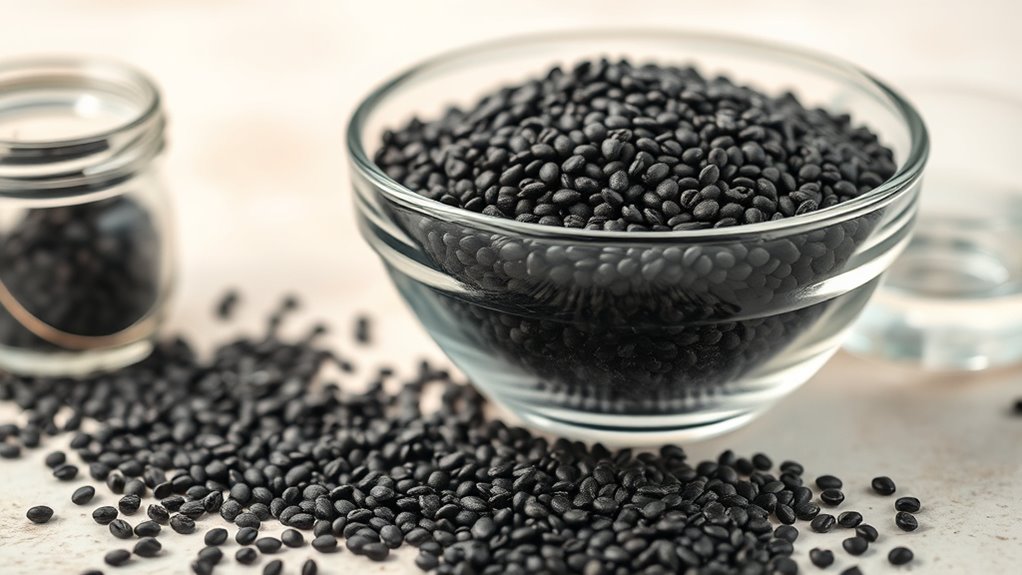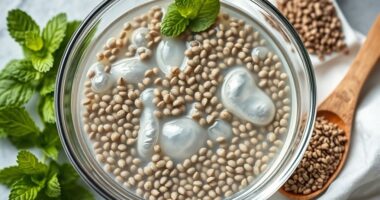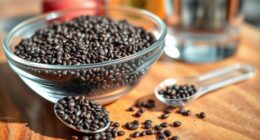Chia seeds are nutritious but can cause side effects if not used carefully. Common issues include digestive discomfort like bloating or gas, especially if you start with large amounts, so increase intake gradually. Allergic reactions are rare but serious, requiring immediate medical attention. To stay safe, always soak chia seeds before eating to prevent choking and ensure proper digestion, and drink plenty of water. Keep these tips in mind for a healthy, safe experience—more details follow.
Key Takeaways
- Soak chia seeds before consumption to enhance digestibility and reduce choking risks.
- Start with small servings and gradually increase to minimize digestive issues like bloating or gas.
- Consume with plenty of water (at least 8 ounces per serving) to prevent dehydration and aid digestion.
- Be cautious if you have tree nut or seed allergies, and seek medical advice if allergic reactions occur.
- Individuals with gastrointestinal conditions should consult a healthcare provider before adding chia seeds to their diet.

While chia seeds are widely praised for their health benefits, it’s important to be aware of potential side effects. One of the main concerns involves allergic reactions, which, although rare, can be serious. If you notice symptoms like skin rashes, itching, swelling, difficulty breathing, or dizziness after consuming chia seeds, you should seek medical attention immediately. People with known allergies to tree nuts or seeds might be more prone to allergic responses, so it’s wise to introduce chia gradually into your diet and monitor how your body reacts. If you experience any adverse reactions, stopping consumption and consulting a healthcare professional is the safest course of action.
Digestive issues are another common side effect associated with chia seeds, especially if you consume them in large quantities or without adequate hydration. Chia seeds are high in soluble fiber, which absorbs water and forms a gel-like substance in your digestive tract. While this can promote healthy digestion and help regulate bowel movements, it can also cause bloating, gas, or constipation if your body isn’t used to the fiber load or if you don’t drink enough fluids. To minimize these problems, start with small servings, such as a teaspoon or tablespoon, and gradually increase your intake as your body adjusts. Always consume chia seeds with plenty of water—at least 8 ounces per serving—to help them expand safely and move smoothly through your digestive system.
Another precaution to [contemplate] is how you prepare chia seeds. Eating dry seeds can be difficult to digest and might increase the risk of choking or digestive discomfort. Soaking the seeds before eating them is highly recommended. Soaked chia seeds are easier to digest, and the soaking process allows your body to better absorb their nutrients. You can add them to smoothies, yogurt, oatmeal, or make chia pudding. Additionally, if you have existing gastrointestinal conditions, such as irritable bowel syndrome (IBS), you should consult with a healthcare professional before adding chia seeds to your diet, as their high fiber content might exacerbate symptoms. Proper preparation techniques can help prevent potential issues and maximize their health benefits.
Frequently Asked Questions
Can Chia Seeds Cause Allergic Reactions in Some Individuals?
You might wonder if chia seeds can cause allergic reactions. Yes, in some individuals, seed sensitivity can lead to allergy symptoms like itching, swelling, or difficulty breathing. If you notice these signs after consuming chia seeds, it’s best to cease use and consult a healthcare professional. Being aware of allergy symptoms helps you avoid potential risks and ensures you enjoy chia seeds safely.
Are There Any Medications That Interact Negatively With Chia Seeds?
Did you know that only a small percentage of people experience drug interactions with chia seeds? While generally safe, chia seeds can affect medication safety, especially for blood thinners or medications for diabetes. They may interfere with absorption or amplify effects. To stay safe, consult your healthcare provider before adding chia seeds if you’re on medication. Being aware of potential drug interactions helps you enjoy their benefits safely.
How Do Chia Seeds Affect Blood Sugar Levels?
Chia seeds can positively impact blood sugar regulation by slowing down digestion and absorption of carbs, which helps prevent spikes. They may also improve insulin sensitivity, making your body respond better to insulin. Incorporating chia seeds into your diet might help stabilize your blood sugar levels. Just remember to start with small amounts to see how your body reacts, and pair them with balanced meals for best results.
Can Pregnant or Breastfeeding Women Safely Consume Chia Seeds?
Imagine a delicate balance, like walking a tightrope. When it comes to pregnancy safety and breastfeeding considerations, you should tread carefully with chia seeds. While they’re generally safe, it’s best to consult your healthcare provider before adding them to your diet, especially during pregnancy or breastfeeding. Your provider can guide you, ensuring you maintain that balance and nurture both your health and your baby’s well-being.
What Is the Recommended Daily Intake of Chia Seeds?
You should aim for a daily intake of about 1 to 2 tablespoons of chia seeds, which is roughly 15 to 30 grams. This chia seed portion fits within daily intake guidelines and provides beneficial nutrients like omega-3s, fiber, and protein. Remember to soak or grind them for better absorption. Start with a smaller amount to see how your body reacts and gradually increase as needed.
Conclusion
Remember, moderation is key when adding chia seeds to your diet. While they offer many benefits, consuming too much can lead to digestive discomfort or other side effects. Start small and increase gradually, listening to your body’s signals. As the saying goes, “A little goes a long way.” By being mindful and cautious, you can enjoy chia seeds safely and reap their health benefits without any worries.









